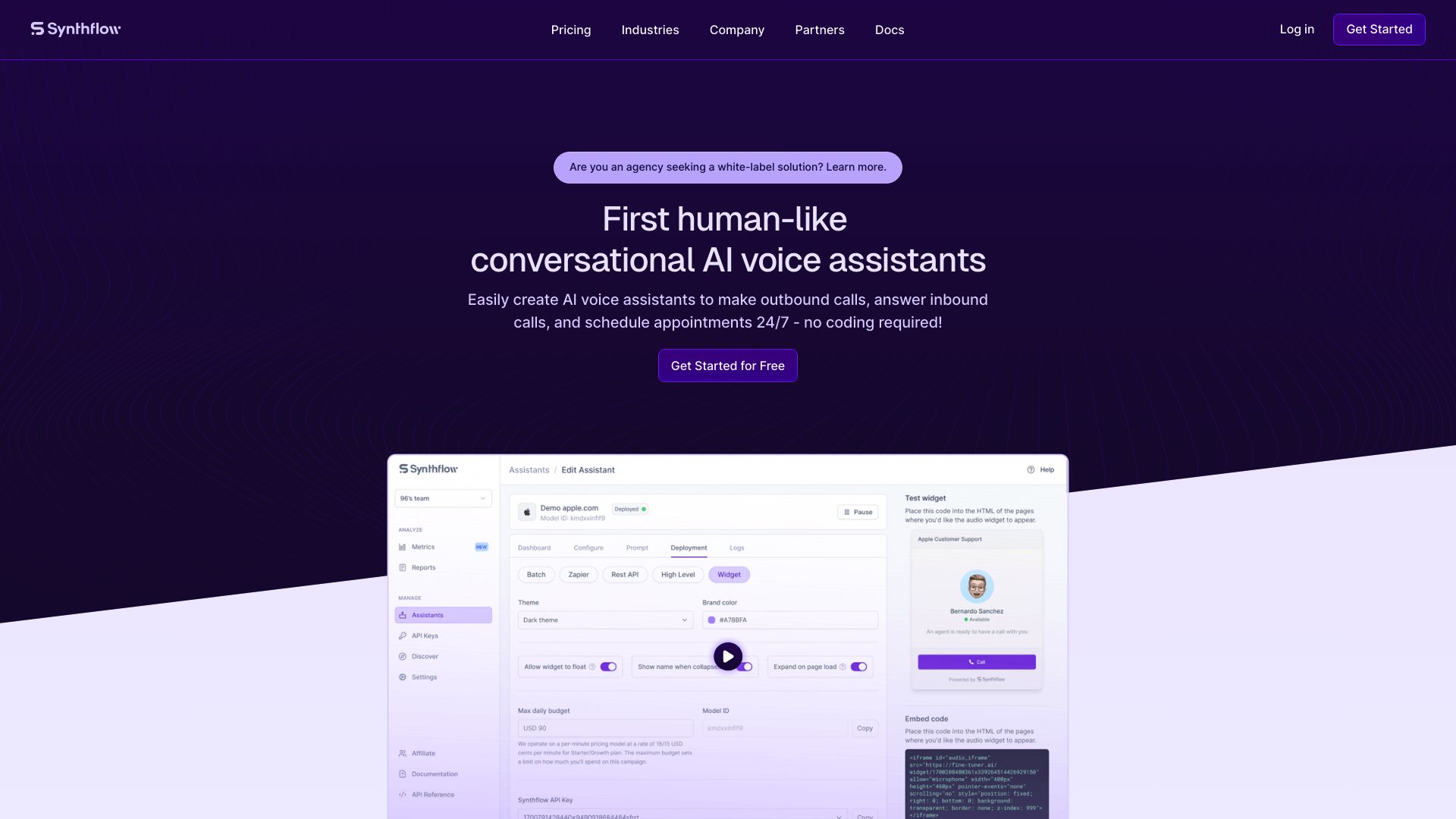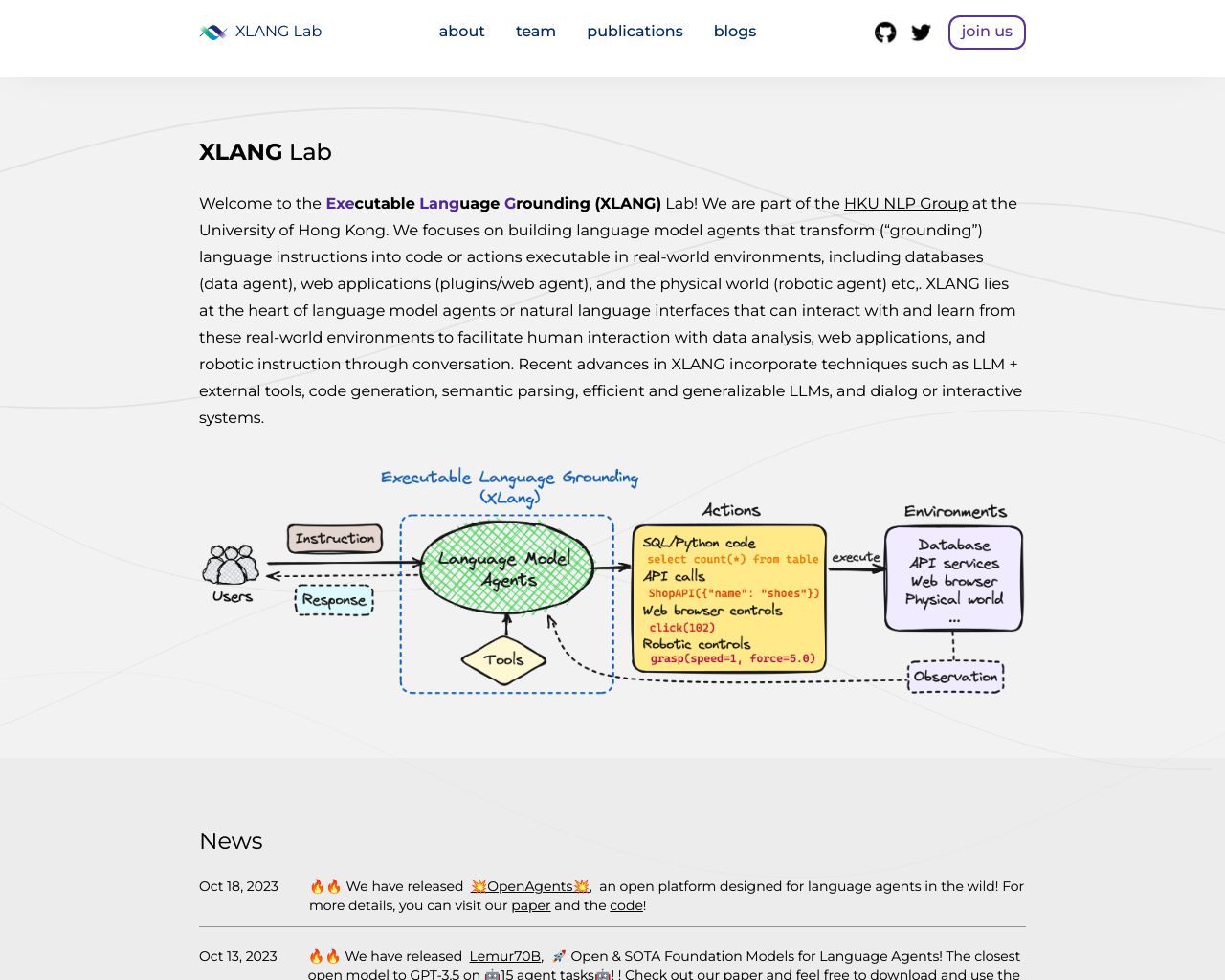AI agent development platforms revolutionize how businesses harness artificial intelligence, but not all solutions are created equal. Synthflow vs. OpenAgents offer unique approaches, each with distinct strengths and limitations. Synthflow excels in creating voice AI assistants without coding, while OpenAgents provides an open-source platform for diverse AI agent types. This comparison dives deep into their features, security measures, and overall capabilities. We’ll explore how these platforms stack up against SmythOS, a comprehensive solution that addresses the limitations of both. Whether you’re a developer seeking advanced customization, a business leader focused on scalability, or a non-technical user looking for accessible AI tools, this review equips you with the knowledge to choose the right platform for your AI agent development needs.
Synthflow Overview
Synthflow offers a powerful platform for creating customizable AI voice assistants without coding expertise. The no-code interface enables businesses to deploy AI agents with distinct personalities and capabilities aligned with their brand identity.

The platform excels in versatility, supporting various tasks like customer support, lead generation, appointment scheduling, and issue triaging. Synthflow prioritizes data security, providing unlimited secure storage in a dedicated Pinecone environment. This focus on privacy and compliance makes it suitable for businesses handling sensitive information.
Synthflow prioritizes data security, providing unlimited secure storage in a dedicated Pinecone environment. This focus on privacy and compliance makes it suitable for businesses handling sensitive information.
Synthflow’s intuitive interface allows users to create and manage AI agents visually, reducing the barrier to entry for AI implementation. The platform supports batch deployments for large-scale communication campaigns and offers real-time interaction through website widgets. These features make Synthflow adaptable to diverse business needs and scalable as organizations grow.
While Synthflow offers robust capabilities, it primarily focuses on voice AI assistants. This specialization may limit its applicability for businesses seeking more diverse AI agent types or multimodal interactions. Additionally, the platform’s emphasis on pre-built templates and guided creation, while beneficial for many users, might constrain advanced developers seeking more granular control over AI agent development.
Synthflow integrates seamlessly with third-party tools like 11Labs and Twilio, enhancing its functionality. The platform also supports deployment through various channels, including GoHighLevel, Zapier, REST API, and direct website integration. This flexibility in integration and deployment options allows businesses to incorporate Synthflow’s AI assistants into their existing tech stack efficiently.
OpenAgents Overview
OpenAgents offers an innovative open-source platform for creating, hosting, and managing AI agents. The system revolves around three specialized agents: Data Agent for complex data analysis, Plugins Agent with over 200 integrated tools for everyday tasks, and Web Agent for autonomous web browsing.
Data Agent excels in processing large datasets, generating insights crucial for roles like marketing. The Plugins Agent stands out with its vast array of integrations, adapting to diverse user needs from weather checks to online shopping. Web Agent, equipped with a Chrome extension, streamlines internet navigation by automating website exploration.
OpenAgents offers an innovative open-source platform for creating, hosting, and managing AI agents. The system revolves around three specialized agents: Data Agent… Plugins Agent… and Web Agent…

OpenAgents emphasizes user-friendliness with a web UI and backend server, making it accessible to non-experts. The platform allows deployment on localhost and supports the integration of new agents and plugins, showcasing its adaptability. However, it lacks some advanced features like multimodal interactions, foundation AI models, and certain deployment options such as GPT deployment.
While OpenAgents provides powerful tools for AI agent creation, it may face challenges in scaling for enterprise-level needs and lacks some security features like IP control. The platform’s open-source nature offers flexibility but might require more technical expertise for advanced customizations. OpenAgents aims to bridge the gap between expert and non-expert users, focusing on practical, real-world applications of AI agents in daily life.
Feature Comparison
Synthflow and OpenAgents offer distinct approaches to AI agent development, with notable differences in their core capabilities and focus areas. Synthflow excels in creating customizable AI voice assistants without coding, while OpenAgents provides an open-source platform for diverse AI agent types.
Synthflow’s strength lies in its no-code visual interface and robust voice AI capabilities. It offers hosted agents for both development and production, secure data storage, and integration with tools like Zapier. However, Synthflow lacks support for foundation AI models and multimodal interactions, limiting its versatility compared to more comprehensive platforms.
OpenAgents, on the other hand, provides a broader range of AI agent types, including specialized Data, Plugins, and Web agents. It supports autonomous web browsing and offers extensive plugin integration. However, OpenAgents falls short in some security features, lacking IP control and certain deployment options like GPT deployment.
Both platforms have gaps in core components. Synthflow doesn’t offer foundation AI models or Huggingface AI integration, while OpenAgents lacks some advanced security features. Neither platform provides comprehensive multimodal support or certain specialized tools like sitemap crawlers or YouTube transcript crawlers.
In terms of security, Synthflow emphasizes data encryption and OAuth support, but lacks IP control. OpenAgents’ security features are less clearly defined, potentially posing challenges for users with strict security requirements.
While both platforms offer valuable tools for AI agent development, they each have distinct strengths and limitations. Users must carefully consider their specific needs when choosing between these options, particularly regarding voice AI capabilities, security requirements, and the desired range of AI agent types.
Feature Comparison Table
| Synthflow | OpenAgents | SmythOS | |
|---|---|---|---|
| CORE FEATURES | |||
| Visual Builder | ✅ | ❌ | ✅ |
| No-Code Options | ✅ | ❌ | ✅ |
| Multimodal | ❌ | ✅ | ✅ |
| Agent Work Scheduler | ✅ | ❌ | ✅ |
| SECURITY | |||
| Constrained Alignment | ✅ | ❌ | ✅ |
| IP Control | ❌ | ❌ | ✅ |
| COMPONENTS | |||
| Huggingface AIs | ❌ | ✅ | ✅ |
| Classifiers | ❌ | ✅ | ✅ |
| Data Lakes | ❌ | ❌ | ✅ |
| DEPLOYMENT OPTIONS (EMBODIMENTS) | |||
| Staging Domains | ❌ | ❌ | ✅ |
| Production Domains | ❌ | ❌ | ✅ |
| Deploy as Scheduled Agent | ✅ | ❌ | ✅ |
| DATA LAKE SUPPORT | |||
| Hosted Vector Database | ✅ | ❌ | ✅ |
| Sitemap Crawler | ✅ | ❌ | ✅ |
| YouTube Transcript Crawler | ✅ | ❌ | ✅ |
| URL Crawler | ❌ | ✅ | ✅ |
| PDF Support | ❌ | ✅ | ✅ |
| Word File Support | ❌ | ✅ | ✅ |
| TXT File Support | ❌ | ✅ | ✅ |
Best Alternative to Synthflow and OpenAgents
SmythOS emerges as the superior alternative to Synthflow and OpenAgents, offering a comprehensive platform for AI agent development and deployment. Our solution combines powerful features with user-friendly design, making it accessible to both technical and non-technical users.
We designed SmythOS to excel in areas where Synthflow and OpenAgents fall short. Our visual builder and no-code options surpass Synthflow’s limited customization capabilities and OpenAgents’ lack of user-friendly interfaces. Users can create sophisticated AI agents without extensive coding knowledge, dramatically reducing development time and costs.
SmythOS stands out with its robust security features, including constrained alignment and IP control, addressing the gaps in both Synthflow and OpenAgents.
SmythOS stands out with its robust security features, including constrained alignment and IP control, addressing the gaps in both Synthflow and OpenAgents. We prioritize data protection and compliance, crucial for businesses handling sensitive information.
Our platform’s versatility shines through its support for multiple AI models, including Huggingface AIs and foundation models. This flexibility, combined with our extensive integration options, allows users to create AI solutions tailored to their specific needs. Whether you’re developing chatbots, data analysis tools, or complex multi-agent systems, SmythOS provides the necessary tools and scalability.
With SmythOS, we offer unparalleled deployment options, including staging and production domains, scheduled agents, and integration with popular platforms. Our hosted vector database and support for various data formats further enhance the platform’s capabilities, making it a truly all-encompassing solution for AI agent development and management.
Conclusion
Synthflow and OpenAgents offer unique approaches to AI agent development, each with distinct strengths. Synthflow excels in creating voice AI assistants without coding, while OpenAgents provides an open-source platform for diverse AI agent types. However, both platforms have limitations in areas such as multimodal support and certain security features.
SmythOS emerges as the superior choice, offering a comprehensive solution that addresses the limitations of both Synthflow and OpenAgents. Our platform provides a powerful drag-and-drop interface, extensive integration capabilities, and support for a wide range of AI models. We enable users to create and deploy AI agents across various platforms seamlessly, from APIs to chatbots and scheduled tasks.
Unlike Synthflow and OpenAgents, SmythOS offers robust multimodal support, foundation AI model integration, and advanced security features. Our platform’s versatility allows for the creation of complex, multi-agent systems that can tackle sophisticated tasks across industries. With SmythOS, users gain access to a vast ecosystem of over 300,000 integrations, empowering them to build AI-driven solutions that truly transform their operations.
We invite you to experience the future of AI agent development with SmythOS. Explore our diverse range of AI-powered agent templates to jumpstart your projects, or create a free account to build unlimited AI agents at no cost. Unlock the full potential of AI for your business and join the SmythOS revolution today.